
Hearts and Minds was a public relations campaign used in the Iraq War (2003-2011).

Hearts and Minds was a public relations campaign used in the Iraq War (2003-2011).
The operation to "win Iraqi hearts and minds", had been established before the war started. One Central Command planner noted that psychological operations (PSYOPs) were slated to play "a crucial role ... to any conflict in Iraq and to the war on terrorism". Senior US military leaders placed such an importance on the operation that they reworked the way in which the related PSYOPs were carried out, often citing the failures during Operation Enduring Freedom, where it took as long as two days to get PSYOPs through the approval process. [1]
On June 15, 2004, Christopher Shays (R-CT), Chairman of the Subcommittee on National Security, Emerging Threats, and International Relations held hearings which had the aim of determining "corrective actions that might be undertaken to regain the confidence and cooperation (hearts and minds) of the Iraqi people, improve public diplomacy messages, and help chart the course for future efforts in Iraq." [2] Shays noted, "The United States and its Coalition partners are attempting to win the hearts and minds of the people in Iraq while providing military security and support to economic and political reform programs. But some assumptions made about Iraq proved faulty, and some policy decisions were controversial and created more doubt than confidence in U.S. capabilities and intentions." [2]
The hearing focused upon two main questions: 1. What policy decisions made by the Coalition Provisional Authority contributed to changes in Iraqi confidence and cooperation? and, 2. What steps does the United States need to take to regain the confidence and cooperation of the Iraqi people? [3]

The Army of the Republic of North Macedonia is the armed force of North Macedonia. The army is organized, prepared and trained to conduct armed struggle and combat and other actions to achieve its constitutional function of defending the independence and territorial integrity of North Macedonia. The army consists of the ground forces and the air force, which are further divided into branches and services. The army has a permanent composition and reserve forces. Since 2005, it is a fully professional defense force compatible with NATO standards.

This article describes the positions of world governments before the actual initiation of the 2003 invasion of Iraq, and not their current positions as they may have changed since then.
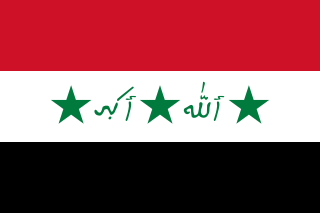
The Coalition Provisional Authority was a transitional government of Iraq established following the invasion of the country on 19 March 2003 by the U.S.-led Multinational Force and the fall of Ba'athist Iraq.
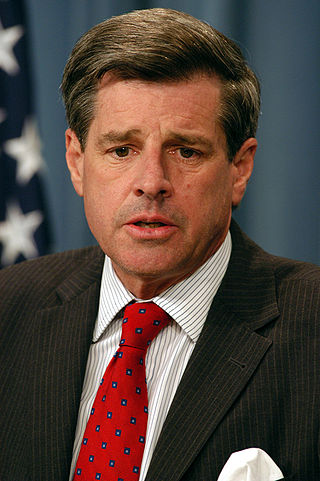
Lewis Paul Bremer III is a retired American diplomat. He was the de facto head of state of Iraq as leader of the Coalition Provisional Authority (CPA) following the 2003 invasion of Iraq by the United States, from May 2003 until June 2004.

A Provincial Reconstruction Team (PRT) was a unit introduced by the United States government, consisting of military officers, diplomats, and reconstruction subject matter experts, working to support reconstruction efforts in unstable states. PRTs were first established in Afghanistan in early 2002, and were used in Iraq as well. While the concepts are similar, PRTs in Afghanistan and Iraq had separate compositions and missions. Their common purpose, however, was to empower local governments to govern their constituents more effectively.

An Iraqi insurgency began shortly after the 2003 American invasion deposed longtime leader Saddam Hussein. It is considered to have lasted until the end of the Iraq War and U.S. withdrawal in 2011. It was followed by a renewed insurgency.
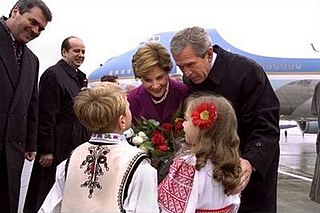
The main event by far shaping the foreign policy of the United States during the presidency of George W. Bush (2001–2009) was the 9/11 terrorist attacks against the United States on September 11, 2001, and the subsequent war on terror. There was massive domestic and international support for destroying the attackers. With UN approval, US and NATO forces quickly invaded the attackers' base in Afghanistan and drove them out and the Taliban government that harbored them. It was the start of a 20-year quagmire that finally ended in failure with the withdrawal of United States troops from Afghanistan.
In May 2003, following the invasion of Iraq in March of that year, the Central Bank of Iraq-Development Fund for Iraq (DFI) account was created at the U.S. Federal Reserve Bank of New York at the request of the Coalition Provisional Authority (CPA) Administrator. A part of the fund has been transferred to Baghdad and Iraq, and the DFI-Baghdad account was opened at the Central Bank of Iraq "for cash payment requirements". The fund also eventually received money from seized and "vested" Iraqi bank accounts and funds seized by coalition forces. $650 million of this amount belongs to Uday Saddam Hussein, the older son of the former Iraqi president. The DFI have been disbursed mainly for "the wheat purchase program, the currency exchange program, the electricity and oil infrastructure programs, equipment for Iraqis security forces, and for Iraqi civil service salaries and ministry budget operations".
The Iraq War began with the US-led 2003 invasion of Iraq. The Government of Canada did not at any time formally declare war against Iraq, and the level and nature of this participation, which changed over time, was controversial. Canada's intelligence services repeatedly assessed that Iraq did not have an active WMD program.

In the United States, propaganda is spread by both government and non-government entities. Throughout its history, to the present day, the United States government has issued various forms of propaganda to both domestic and international audiences. The US government has instituted various domestic propaganda bans throughout its history, however, some commentators question the extent to which these bans are respected.
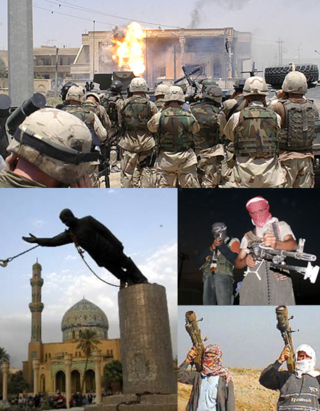
The Iraq War was a protracted armed conflict in Iraq from 2003 to 2011. It began with the invasion of Iraq by the United States-led coalition that overthrew the Ba'athist government of Saddam Hussein. The conflict continued for much of the next decade as an insurgency emerged to oppose the coalition forces and the post-invasion Iraqi government. US troops were officially withdrawn in 2011. The United States became re-involved in 2014 at the head of a new coalition, and the insurgency and many dimensions of the armed conflict are ongoing. The invasion occurred as part of the George W. Bush administration's war on terror following the September 11 attacks.

Psychological operations (PSYOP) are operations to convey selected information and indicators to audiences to influence their motives and objective reasoning, and ultimately the behavior of governments, organizations, groups, and large foreign powers.

Political leaders of the US and UK who led the arguments which resulted in the invasion of Iraq have claimed that the war was legal. However, legal experts, including the chairman of the Iraq Inquiry, John Chilcot, who led an investigation with hearings from 24 November 2009 to 2 February 2011, concluded that the process of identifying the legal basis for the invasion of Iraq was unsatisfactory and that the actions of the US and the UK have undermined the authority of the United Nations.

Foreign internal defense (FID) is a term used by the military in several countries, including the United States, France, and the United Kingdom, to describe an integrated, or multi-country approach to combating actual or threatened insurgency in a foreign state. This foreign state is known as the Host Nation (HN) under the US doctrine. The term counter-insurgency is commonly used for FID.
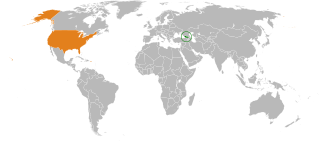
Relations between the countries of Georgia and the United States continue to be very close and encompass multiple areas of bilateral cooperation. One of the key U.S. allies in Eastern Europe, Georgia was the third largest troop contributor in the Iraq War and the largest per-capita contributor to the U.S. led mission in Afghanistan. The United States for its part is actively assisting Georgia in strengthening its state institutions in face of increasing pressure from its northern neighbor Russia and has provided the country with financial assistance in excess of 3 billion dollars since 1991. Since 2009, Georgian–American relations are streamlined by the U.S.–Georgia Charter on Strategic Partnership, which created four bilateral working groups on priority areas of democracy; defense and security; economic, trade, energy issues, people-to-people and cultural exchanges.
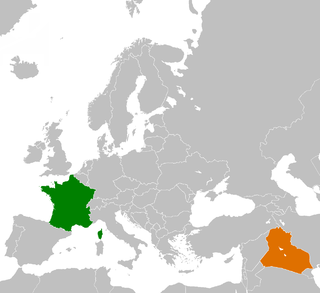
French–Iraq relations are the relations between France and Iraq. France played a major role in Iraqi secession from the Ottoman Empire and eventual freedom from British colonial status. The Franco-Iraqi relationship is often defined by conflict and peace, with France supporting Iraq during the Iran-Iraq War, supporting intervention in Iraq in Operation Desert Storm, and opposing the 2003 U.S. Invasion of Iraq. As of 2004, Iraq maintains an embassy in Paris and France maintains an embassy in Baghdad and a consulate general in Erbil.
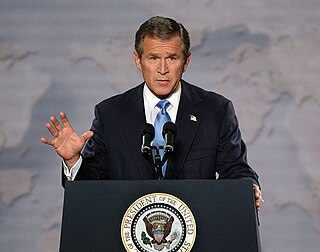
Prior to the Iraq War, the United States accused it of developing weapons of mass destruction and having links with al-Qaeda. In 1991, the United Nations Security Council Resolution 687 was adopted and subsequent UN weapons inspectors were inside Iraq. This period also saw low-level hostilities between Iraq and the United States-led coalition from 1991–2003.

De-Ba'athification refers to a policy undertaken in Iraq by the Coalition Provisional Authority (CPA) and subsequent Iraqi governments to remove the Ba'ath Party's influence in the new Iraqi political system after the U.S.-led invasion in 2003. It was considered by the CPA to be Iraq's equivalent to Germany's denazification after World War II. It was first outlined in CPA Order 1 which entered into force on 16 May 2003. The order declared that all public sector employees affiliated with the Ba'ath Party were to be removed from their positions and to be banned from any future employment in the public sector.

The Iraqi conflict refers to a near-continuous series of events that began with the 2003 invasion of Iraq and deposition of Iraqi president Saddam Hussein.